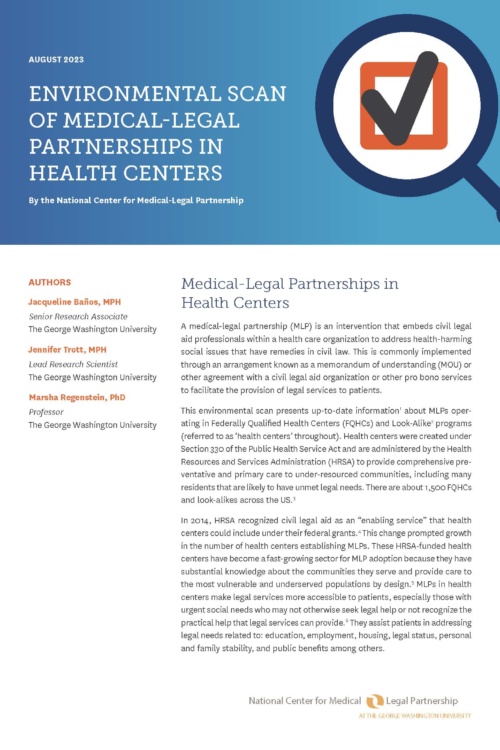
Report: Environmental Scan of Medical-Legal Partnerships in Health Centers
Friday, August 4, 2023
Environmental Scan of Medical-Legal Partnerships in Health Centers
In 2022, the National Center for Medical-Legal Partnership and researchers at the George Washington University conducted an environmental scan of medical-legal partnerships (MLPs) operating in Federally Qualified Health Centers (FQHCs) and Look-Alike programs (also referred to as “health centers” throughout).
MLP is an evidence-based approach that integrates the unique expertise of lawyers into healthcare settings. MLP strengthens the healthcare workforce’s capacity to identify and address the health-related legal needs of patients and structural problems that cause health inequities. Health centers were created under Section 330 of the Public Health Service Act and are administered by the Health Resources and Services Administration (HRSA). Approximately 1,400 FQHCs and Look-Alikes provide comprehensive preventative and primary care to over 30 million people in under-resourced communities throughout the United States. Since HRSA recognized civil legal aid as an “enabling service” in 2014, health centers have become one of the fast-growing sectors for MLP adoption.
This report of the 2022 environmental scan provides up-to-date information on MLP implementation or planning at health centers. The report explains how these health centers use MLP to identify patients with health-related legal needs and make legal services accessible for low-income and underserved communities. Read the report to understand the requirements for the sustainability of MLPs in health centers.
Have questions about this publication? Email us at ncmlp@gwu.edu.
This publication was supported by the Health Resources and Services Administration (HRSA) of the U.S. Department of Health and Human Services (HHS) as part of an award to the National Center for Medical-Legal Partnership with 0 percent financed with non-governmental sources. The contents are those of the author(s) and do not necessarily represent the official views of, nor an endorsement, by HRSA, HHS, or the U.S. Government. For more information, please visit HRSA.gov.
